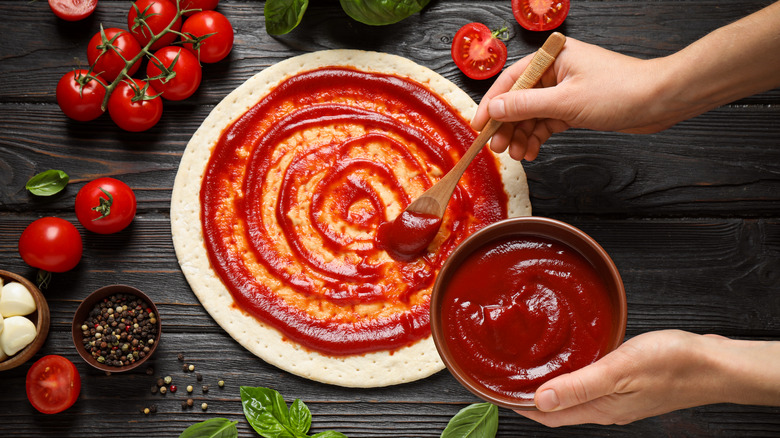The Secret Ingredient That Makes Homemade Pizza Sauce Restaurant-Worthy
Even if you're lucky enough to live in close proximity to some amazing pizzerias, it's still a special sort of treat to enjoy a fresh, steaming hot pizza that just came out of your own oven. For truly great homemade pizza, the sauce is key — it's the main source of zesty, sweet, umami flavor and (sort of literally) the glue that holds everything together.
Fortunately, a good sauce isn't hard to make. A handful of common ingredients and a spin in a food processor are all you need to make a tomato sauce that satisfies your pizza cravings. There's one ingredient, though, that will really make homemade pizza sauce rival the stuff made by the pros: balsamic vinegar.
You may not even realize it, but most pizzas you've eaten in your life probably had balsamic vinegar in the sauce. Not only is it dense with flavor, but the sweetness and acidity of a nice balsamic work to complement the sweetness and acidity of the tomatoes. A healthy dose of balsamic vinegar gives pizza sauce a jolt of succulent, mouthwatering flavor that even Nonna would approve of.
Skip the sugar in pizza sauce
It's pretty common for pizza sauces — especially, but not exclusively, premade sauces — to include a hefty amount of sugar. Some people prefer a sauce that's noticeably sweet, but unless you want your pizza to taste like it was made by an animatronic mouse, step away from the white sugar. The canned tomatoes you use will already lend some of their natural sweetness to the sauce, and the balsamic vinegar can provide the rest. And if you're out of balsamic, or just want a different taste, red wine vinegar will work, too.
A rich, flavorful balsamic vinegar brings a kind of sweetness that's balanced, elegant, and perfect for a savory dish — because the last thing a good pizza needs is an overly-sweet tomato sauce. Go easy at first, starting with just a teaspoon or so. Once you've incorporated the rest of the seasonings, taste and add more balsamic vinegar if you want a little more subtle sweetness, or if it could use brightening up. A little bit of acidity added to tomato sauce can make it bright and beautiful.
The case for going homemade
When you're grocery shopping for your pizza ingredients, it can be tempting to just grab a jar of premade tomato sauce, rather than getting canned tomatoes, tomato paste, olive oil, vinegar, herbs, and so on. But given how easy it is to make homemade pizza sauce, it's really worth the little bit of extra work. Apart from the fact that you can make it to suit your taste, it's also a chance to impart bigger, brighter flavors.
Pizza sauce and pasta sauce might seem interchangeable, but there's one main difference: Pizza sauce, unlike Nonna's Sunday gravy, isn't simmered for hours beforehand. In fact, it's not cooked at all until the pizza goes into the oven. Because you're spreading the sauce in a fairly thin layer, it will cook sufficiently atop the pizza. And when it does, the flavors of the sauce will mellow and marry so that you have a zesty, garlicky, bright, and slightly sweet sauce in which no one flavor overpowers the rest. Starting with raw ingredients means that you're letting each component bring its strongest, most powerful taste, and not pre-dampening anything by cooking off bold flavors. And as long as your sauce has a healthy kick of balsamic vinegar to it, you have a good chance at making a pizza that's just as rich and delicious as the ones at your favorite restaurant.


